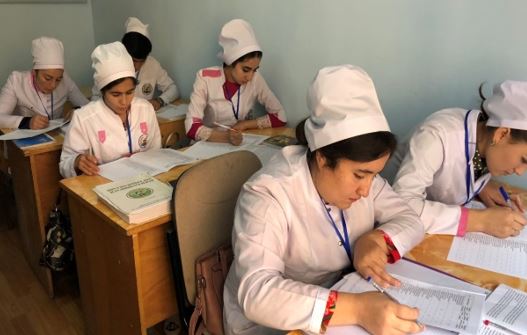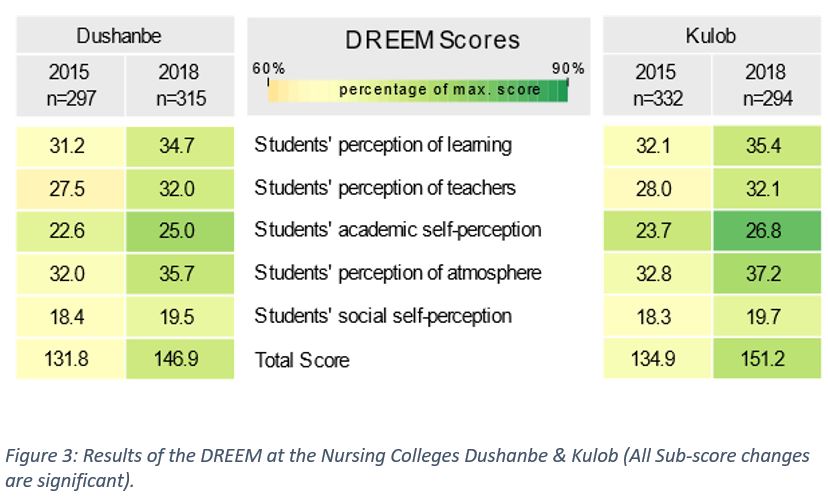In-country activities
Tajikistan | End-line Evaluation of the Educational Environment of two Nursing Colleges

The reform of education for family nurses is a priority of the National Health Strategy 2010–2020 of the Government of Tajikistan. SDC's Medical Education Reform project (MEP) supports the Government in its efforts to modernize nurse education by increasing the focus on competency-based learning and clinical skills.
To assess nursing student's perceptions of their learning environment the Dundee Ready Education Environment Measure (DREEM) instrument was applied as a baseline in two nursing colleges in 2015. The DREEM is a well-established instrument tool for measuring the subjective educational environment in medical education programs. It consists of a 50-statement questionnaire with the possibility to respond along a five-point Likert-scale ranging from 0 to 4 (strongly disagree → 0, disagree → 1, unsure→ 2, agree → 3, strongly agree → 4). These 50 items are grouped in five dimensions or sub-scores, namely students 'perception of learning, students' perception of teachers, students' academic self-perception, students' perception of atmosphere, and students' social self-perception. A sub-score is simply calculated as the sum of the corresponding item scores. The total score is the sum of all item scores (or the five sub-score) and ranges therefore between 0 and 200.
Based upon the findings of the baseline study, steps were taken to refresh the curriculum, improve the clinical skills lab, build the didactical skills of tutors, and bring more nurses into teaching to help establish a positive role model for nursing students.
The DREEM was re-applied in late 2018 to assess the change in perceptions over time. The study population were 2nd and 4th year nursing students at the nursing colleges in Dushanbe and Kulob. For
both the base- and the end-line study, a total number of 600 study students were targeted, with 150 participants from each subgroup.
The results were stratified by age, sex, and year of study and show that between 2015 and 2018 the perception of the learning environment improved with a significant increase of the mean total DREEM score from 133.4 to 148.9. The data from 629 students (72.8% female/27.2% male) for the baseline and 609 students (80.9% female/19.1 male) for the end-line study show a significant improvement for all sub-scores over time.


These scores are indicative of a positive evolution, so it is generally recommended to maintain the currently prevailing strategic directions. However, there are still areas of concern and the results from the endline study lead to the following recommendations:
(1) To review and further extend the role of practical training and if the Clinical Skills Labs could be used more efficiently, i.e. if the timetable can be arranged such that capacities are fully utilized.
(2) To review areas of improvement in the didactical trainings for teachers. The teaching style is still partially critically perceived and predominantly categorized as too teacher-centred. Beyond further didactic training, regular feedback-mechanisms from the students to teachers (involving the faculty) could help to improve communication between teachers and students increasing their participation in the design of the courses.
(3) To develop adequate monitoring systems, support structures and counselling for students that suffer from high levels of stress. The educational system must make sure that the learning system is regularly checked for causes of stress, teachers sensitized about the problems that students face and a counseling focal point defined.
Useful links
For more information about the nursing component in this project in Tajikistan see film:
http://medcollege.tj/index.php/video-rolik-o/201-baland-bardoshtani-sifati-omodasozii-amshira-oi-tibbi-oilav-bo-ro-i-murabbiyat
For more information about the baseline study see: https://bmcmededuc.biomedcentral.com/articles/10.1186/s12909-019-1515-0
Contact

Mohira Khamidova, Nursing Component Coordinator of the Medical Education Reform Project, Tajikistan | mohira.khamidova@swisstph.org
 Dr. Mouazamma Djamalova, Swiss Cooperation Office, Tajikistan | mouazamma.djamalova@eda.admin.ch
Dr. Mouazamma Djamalova, Swiss Cooperation Office, Tajikistan | mouazamma.djamalova@eda.admin.ch
